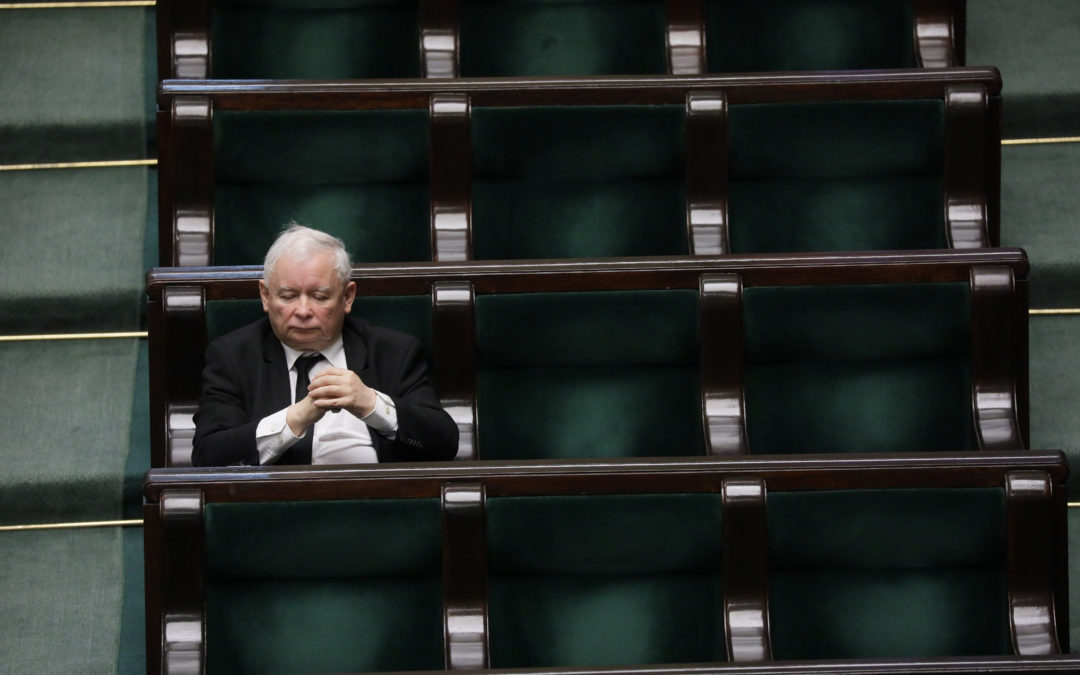Just after 4 a.m. this morning, following an all-night parliamentary session using new online voting rules during the coronavirus crisis, the lower house of Poland’s parliament voted to introduce changes to the electoral code.
They are designed to facilitate presidential elections in May, which many have called to be cancelled due to the epidemic. The measures were attached as amendments to the government’s economic package designed to help businesses, employees and the financial sector during the current crisis.
Among the changes are an expansion of postal voting. Previously this was restricted to a small number of voters, but it will now be available to people in quarantine or self-isolation at the time of the election, as well as anyone aged 60 or above (who can now also vote by proxy).
Postal voting will not, however, be allowed for those voting abroad, despite concerns that Poles living in countries with strict coronavirus measures in place will be disenfranchised.
Yesterday, the Federation of Poles in Great Britain appealed for the elections to be postponed because under current conditions it “would not be possible” for the UK’s million-strong Polish community to vote.
The changes to the electoral code were proposed by the ruling Law and Justice (PiS) party, which has been insistent that elections go ahead, despite strict anti-coronavirus measures that have effectively stopped candidates campaigning.
All opposition candidates have called for the elections to be postponed, arguing that the current situation unfairly favours the reelection bid of incumbent president Andrzej Duda and that allowing a vote would endanger public health. A large majority of the public also want the elections postponed, according to polls.
Many opposition MPs expressed anger that PiS introduced the amendment at 2:30 a.m., not long before voting on it was scheduled. “PiS is violating the rules of parliament,” tweeted Jakub Kulesza, of the far-right Confederation party.
“It’s almost four in the morning, there is a funereal atmosphere in the chamber, as we wait for voting on PiS’s amendment breaking all rules of the electoral law,” wrote Bartłomiej Sienkiewicz, of the centrist Civic Platform (PO). “Republics, it turns out, die unspectacularly.”
Prawie czwarta rano, na sali grobowy nastrój, czekamy na głosowanie poprawki PiS nr177 łamiącej wszelkie reguły stanowienia prawa wyborczego. Republiki, jak się okazuje, obumierają bardzo niespektakularnie. pic.twitter.com/41YLlH2J5D
— Bartłomiej Sienkiewicz (@BartSienkiewicz) March 28, 2020
According to rulings by the Constitutional Tribunal, significant changes to the electoral code must be made at least six months before elections are called, noted another PO MP, Michał Szczerba. Therefore the changes voted through this morning are not applicable to the upcoming elections, he argued.
In response, a PiS MP, Joanna Lichocka, tweeted that the Tribunal’s rulings do not apply to “technical changes in voting methods” and accused PO of “misleading the public”.
However, a legal scholar from the Jagiellonian University, Mikołaj Małecki, concurred with Szczerba that “elections will be invalid” if held using the new rules, which were passed in “gross violation of parliamentary rules and the constitution”, reported news website Gazeta.pl.
Yet even though PO opposed the amendment changing the electoral code, it still ended up voting in favour of the legislative package that it was part of, noted many MPs from the Left. That vote, which took place after 6 a.m., was passed by a large majority, with 343 votes in favour, all coming from PiS and the Civic Coalition that PO dominates.
All MPs from the Left, as well as the centre-right Polish People’s Party and the Kukiz’15 grouping, voted against the legislation. The Confederation abstained.
Nie tylko ostrzegaliście, ale wręcz pomogliście. Po co ta skromność?https://t.co/EBH4eoCWjd https://t.co/MUMV3UtHYl pic.twitter.com/L1y0Mp1eII
— Andrzej Rozenek (@ARozenek) March 28, 2020
The legislation has now passed to the upper-house Senate, which can briefly delay bills and suggest amendments. These can, however, be overruled by the more powerful lower-house Sejm.
Main image credit: Slawomir Kaminski/Agencja Gazeta

Daniel Tilles is editor-in-chief of Notes from Poland. He has written on Polish affairs for a wide range of publications, including Foreign Policy, POLITICO Europe, EUobserver and Dziennik Gazeta Prawna.




















